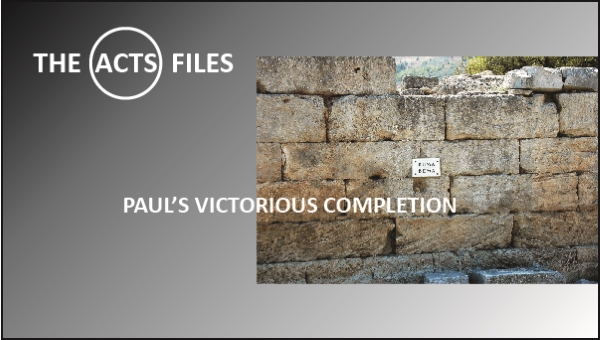By Tyson Thorne

After ministering in Corinth for half a year the Jews were at wits end with Paul (Acts 18.12-.23). Luke describes their arrest of Paul as an ”attack” to assure we understand that brutality was involved. After his beat down they brought him before Gallio the proconsul of their region in hopes of his consent to a state execution. The Romans, however, were never anxious to enter the affairs of the Jews and this situation was no different. Speaking legal-eze he proclaimed that “there was no justification in accepting the complaint.” We know this to be a legal phrase as it is used in other legal discourses of the time.
Simply dismissing the case was not enough to clear the room much to Gallio’s dismay, and the Roman guard had to physically force them out of the courtroom. Nonplused the Jews returned with Sosthenes, the former synagogue ruler and the man whom Paul was staying with, and beat him mercilessly in front of the judgment (bema) seat and Gallio. For the second time the proconsul expressed his disinterest in Jewish affairs and finally the Jews gave up their pursuit of the matter.
Paul stayed on for some time after these events, ministering to the Gentiles presumably as he had walked away from the Jews some months before. This time he would not leave town defeated or running for his life. He was leaving on his own terms. Paul and Silas had been gone from Antioch for around a year, and it was time to head home. He travelled with new friends Priscilla and Aquila to Cenchrea, a nearby city on the other side of the Isthmus from Corinth and was likely a better port to leave from when traveling east. While in Cenchrea, before boarding the ship, Paul shaved his head to fulfill a vow he had taken. While Luke gives us no specifics about the vow, we will discuss tomorrow the likely Biblical vow that Paul was under at the time.
The group left Cenchrea by ship and stayed a short time in the port city of Ephesus, which was nearly directly across the Aegean Sea from Corinth. Paul made an appeal to the Jews in their synagogue, perhaps feeling he needed to make peace with the way he treated those in Corinth. On this occasion he left them wanting more, and he promised to return one day if God allowed.
The statement Paul makes, “I will come back to you again if God wills” shows Paul’s continued reliance and dependence on God. It was unlike Paul to leave after being so warmly received, but perhaps he honestly believed it was better to be on his way before things took a turn for the worse, as they always did. Alternatively, he may have left because winter was coming and once in full swing the seas would become impassable, preventing him from making Jerusalem and Antioch until the following Spring.
Priscilla and Aquila decided to stay in Ephesus and Paul made land in Caesarea and journeyed on foot to Jerusalem. After debriefing the church there he returned to his home church of Antioch. It wasn’t long before Paul got the inclination to travel once more, and he went to the northern churches he founded during his first missionary journey, to strengthen and check in on them.
From the beginning to the end of this second missionary journey Paul demonstrates his complete dependence on God. Along the way we witness Paul’s willingness to overcome any challenge and take any risk to bring the good news about the Messiah to as many people as possible. There were times they had little to eat, were severely beaten, survived a stoning, endured legal disputes all without ever losing site of the mission or without ever serving others as well as he was serving God. Through it all God was faithful to sustain Paul, sometimes through circumstances and visions, and other times through relationships. Paul made three life-long friends along the way, Timothy, Aquila and Priscilla. They would prove themselves to be a blessing in Paul’s later life trials. He sets a wonderful example of Christian charity, mission and friendship. There are few people in all the Bible who we might compare ourselves to and hold up as an example to follow, Paul certainly earns a top spot on that short list.
|
|
|